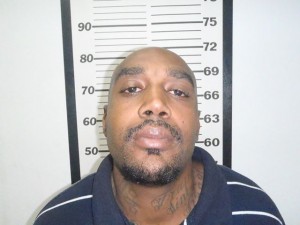Phillip W. Smith walked into Ferguson TV, VCR and Satellite Service in Caseyville on the morning of Nov. 14, 2013 and demanded money from the co-owner, Judy Ferguson. Ferguson pulled $42 out of her wallet — it was all the money she had – and gave it to Smith, who responded by firing 11 shots at her. Six of the bullets hit her, all over her body.
Ferguson screamed at Smith, begging him not to shoot her. After suffering six entry and six exit wounds, Ferguson slumped into a chair that filled with her blood. She could feel Smith breathe on the back of her neck as she lay motionless. He stopped at the door and looked back at Ferguson before leaving the shop she had run with her husband for 30 years. He did not want to leave a witness, Ferguson’s husband said.
Those details emerged in victim impact statements read by Steve Wigginton, United States’ Attorney for the Southern District of Illinois, in Federal Court Friday. The statements were submitted as part of Smith’s sentencing hearing.
After hearing all of the evidence, Judge David Herndon sentenced Smith to 25 years in federal prison, five years of supervised release, $4,417 in restitution and $300 in special assessments. Smith will not be eligible for parole and waived all rights to appeal, two things Ferguson and her family considered important as part of the deal for Smith to plead guilty.
As Wigginton read the statements, Ferguson sat in the front row of the courtroom, surrounded by rows of family and supporters. State’s Attorney Brendan Kelly was there, as was Jose Alvarez, who was Caseyville’s Police Chief at the time. Current interim Police Chief Frank Moore sat alongside Mayor Leonard Black.
Smith sat listening to the statements with no discernable emotion. Ferguson has scars scattered around her body, she wrote. She spent one month in the hospital, including two weeks after suffering a heart attack shortly after transferring hospitals.
With a right hand that is often difficult to use, Ferguson has learned to eat with her left. After being a 30-year partner in business with her husband, Bill, she is now reduced to answering the telephone. Bill has learned to do the household chores, bathe and dress his wife, who is never sure from day-to-day how difficult it will be for her to walk. Eleven months later, Ferguson goes to physical therapy two times each week and does her rehabilitation exercises at home the other five days.
Ferguson’s daughters Lynn and Theresa directed their statements to Smith.
“In your darkest moments, remember my mom’s voice as she begged you not to shoot her,” Theresa’s statement indicated. “I don’t want you ever to forget the sound of desperation.”
Lynn’s statement showed admiration for her mother, and no pity for Smith.
“(My mom) is a fighter, as you can see. She beat you,” Lynn’s statement read. “I hope God has mercy on you, because our family does not, and will not, ever.”
As Herndon gave the sentence, he commented on the statements.
“When you hear those victim impact statements, one shudders to imagine how dangerous this crime was,” Herndon said.
Smith pleaded guilty on May 7 to interference with commerce with robbery, discharge of a firearm in a crime of violence and possession of ammunition by a felon. The imposed sentence, including waiving his right to appeal, were part of an agreement reached by Wigginton, Judith Kuenneke, the court-appointed defense attorney, and Ferguson’s family.
A picture was painted Friday of Smith as a career criminal with a troubled background. Smith, clinical psychologist Daniel Cuneo testified, lacked supervision as a child and has poor impulse control exacerbated by drug and alcohol use. Cuneo, Wigginton and Kuenneke all agreed that diagnosis is common of defendants in the criminal justice system.
Smith’s father died when Smith was 12. A stove exploded when he was 13, leaving him badly burned. Smith had nightmares about the explosion until he was 17, he told Cuneo. A girlfriend cut Smith at the age of 14.
Although no family member would provide a written statement or appear in court, Smith’s sister spoke with an investigator in Kuenneke’s office, she said. The sister said there was no supervision in the home and called their mom a “bad mother.”
Smith, 33, was committed to a mental hospital in 1996 and convicted of possession of cannabis in 1997, at age 15, court testimony indicated. Smith also witnessed his “first murder” when he was 15. The next year he was convicted for possession of a firearm. Convictions for robbery in Indiana in 2001, residential burglary in St. Clair County in 2003, two THC convictions, another firearm possession and an escape from a Missouri prison followed for Smith, who was called a career criminal in court.
Smith may have grown up on the streets of East St. Louis and had traumatic episodes in his life, Herndon said, but many others do also and choose a different path in life.
“I don’t know what makes the difference,” Herndon said.
Cuneo said Smith’s background, drug and alcohol problems and mental issues combined to make him a dangerous person. Ferguson’s statement made it clear she agreed.
“Frankly, I think he would do it again if he could,” Ferguson said.




